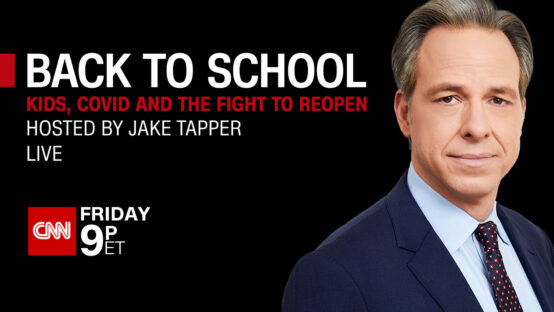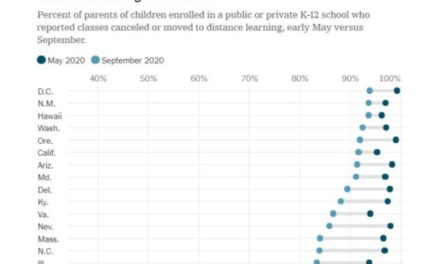In a seven-minute prime-time segment, CNN’s Jake Tapper lobbed softball questions that failed to hold the head of the largest teachers union to account.
By Alexander Russo
On Friday, CNN’s Jake Tapper hosted a school reopening special called Back to School, featuring some good segments but also a very disappointing interview with NEA head Becky Pringle.
During that seven-minute segment, Tapper treats Pringle with kid gloves rather than as the head of a powerful political organization that’s contributed millions to Democratic candidates and played an instrumental role in the school reopening debate.
His questions are soft. He allows Pringle to pivot away and deliver filibuster-length talking points. His efforts at fact-checking are lackluster.
There are limits on what an interviewer can reasonably accomplish with an unwilling respondent. But Tapper has shown his willingness to put the journalistic squeeze on government officials and political leaders who like to squirm away from tough questions.
He just doesn’t do that here.
Above: Segment featuring Tapper’s interview with Pringle.
Watching the video or reading through the transcript, it’s not hard to tell that the segment fails at giving viewers useful information or holding the teachers union to account:
First, Tapper asks Pringle a softball question about how teachers are feeling and what they need “to feel safe back in class?” I’ll spare you a recap of her bland response.
Then Tapper asks a muddled question that was meant to get at instances where districts and teachers appear to be going beyond CDC safety recommendations: “Would you agree that what the CDC says following the science, that that’s an important principle when it comes to this issue?”
But the question ends up coming out vague and limp, and Pringle has no problem returning to her talking points and highlighting how many teachers are parents, too.
Tapper tries to go back to the issue of fairness, talking about how parents and students “are getting the short end of the stick” when vaccinated teachers won’t go back to school.
Pringle avoids answering, claiming that “most of our schools are already back to in-person learning.”
Tapper fact-checks the claim – twice – noting that most reopenings are not five days a week, but Pringle bulldozes her way through, describing the creative things districts are doing and her recent school visits with Biden administration officials. Again she claims that “most of our schools are back to in-person learning already.”
Defeated and out of time, Tapper doesn’t even try to correct the record again, and simply thanks her for being there.

Above: NEA staff seemed quite happy about how well the segment went.
What could Tapper have done?
Interviewers can’t just keep asking the same question over and over. They don’t want to appear hostile or distract viewers from what the subject is saying.
However, they have lots of tools available to try to get straight answers or at least make it clear to viewers what’s happening.
They can ask follow-ups, fact-check misstatements, or flag obvious talking points. They can interject when time is short. Most of all, they can ask sharper questions.
Some examples:
In September, you were quoted claiming that 50,000 kids would die if schools were reopened. Do you still stand by this statement?
The Biden administration has committed to reopening the majority of K-8 schools within 100 days, defined as full-time, five days a week. Does the NEA make the same commitment?
If the CDC revises its guidance down to three feet of social distancing six, will the NEA and its locals still support the CDC standard or will it insist on six feet?
Do you agree that teachers who have been vaccinated as part of a state priority program should agree return to school in person when asked to do so?

The interview would have gone much better if Tapper had asked sharper questions or simply employed familiar strategies for wringing useful information out of powerful people.
Maybe next time he or another journalist who’s interviewing a union leader like Pringle will do so.
ABOUT THE AUTHOR

Alexander Russo
Alexander Russo is founder and editor of The Grade, an award-winning effort to help improve media coverage of education issues. He’s also a Spencer Education Journalism Fellowship winner and a book author. You can reach him at @alexanderrusso.
Visit their website at: https://the-grade.org/














